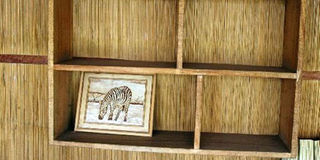Kisumu women weaving their way out of misery

Papyrus mat wall frame holder made by Nyando Wetland project. JACOB OWITI
What you need to know:
- ‘‘Our initiative to harvest papyrus reeds and craft them into high quality products started way back in 2000. The production waste is also reused as manure,” says Ms Orieng’.
A group of women in Kisumu County are using locally available materials to address their social and economic challenges while conserving the environment.
The women have turned papyrus reeds that grow in swampy areas into a money spinner by harvesting, processing and crafting high quality sleeping mats, baskets, coffins, chairs, book shelves and table mats.
Started seven years ago, Nduru Wetlands Women’s Group in Kawino South has been able to create more than 500 jobs, provide entrepreneurial skills training to youths and the disadvantaged and preserve the local culture of weaving.
With an initial capital of Sh2,000, the group has strengthened community engagement in development projects and currently has an annual turnover of Sh100,000.
The group’s leader Rose Atieno Orieng’ says the papyrus-based products are gaining popularity among traders who buy in bulk and sell them locally and internationally.
‘‘Our initiative to harvest papyrus reeds and craft them into high quality products started way back in 2000. The production waste is also reused as manure,” says Ms Orieng’.
To conserve wetland areas, the group has also been planting 1,500 tree seedlings every year.
They have been able to set aside savings and 10 per cent of the revenues collected from the sale of papyrus products is put back into the community and used to provide training in tree nursery management and entrepreneurship.
The group’s leader adds that the initiative also protects the environment through the supply of tree seedlings to homes.
‘‘We have been able to provide alternative cheap and environment-friendly products for the local communities,’’ Ms Orieng’ says.
A member, Wilfrida Otengo, says that the initiative has created a stable source of income for many families while generating community funding.
Ms Otengo notes that the high demand for their products is luring more people into the trade as consumers discover the usefulness of the reeds in roofing.
Mats made from papyrus reeds are used as ceiling boards especially for iron sheet roofs and they provide a cooling effect. Ms Orieng’ says most of their customers are traders from within Rabuor and from as far Kibuye market in Kisumu.
‘‘We also have traders coming from as far as Eldoret and Migori counties to buy our products’’, she adds.
A medium mat goes for Sh300 while the big mat costs Sh500. Furniture such as stools, chairs, sofa sets and bookshelves retail at between Sh1,500 and Sh3,000.
The group says business people purchase the products in bulk and sell them to tourists and cultural organisations which value the products so much.
‘‘I can assure you that the business is really promising given the unique quality of the products which are blended with various materials and colours,’’ said a Kirinyaga businessman Peter Waweru, when we caught up with him at the nearby Rabuor market.
The papyrus reeds are available on the shores of Lake Victoria.
The group has assigned six of its members the duty of cutting the papyrus reeds every morning. The reeds are dried in the sun for about three days before the members embark on weaving.
By EVERLINE OKEWO [email protected] Businessdailyafrica.com




